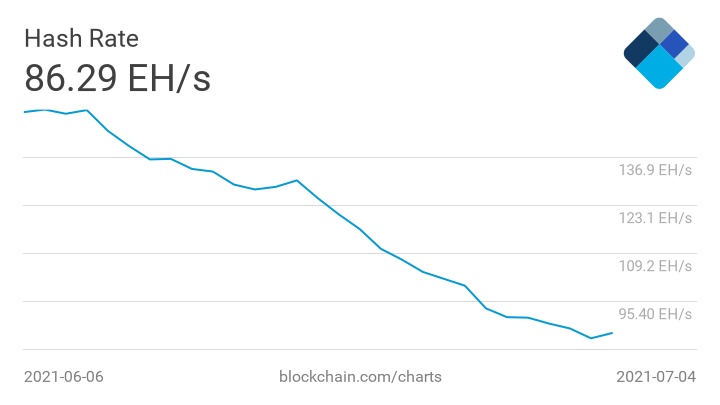Bitcoin Now Easier to Mine Thanks to Chinese Bans
The shutdown of much of bitcoin's network due to Chinese crack down has prompted changes to its algorithm. With the update, the cryptocurrency is now 28% easier to mine.

- Bitcoin's algorithm update made the cryptocurrency 28% easier to mine - an automatic response to the loss of computing power caused by ban in China.
Cryptocurrency mining bans enforced by Chinese authorities result in changes to bitcoin's algorithm. More than 50% of rigs mining BTC were located in restricted areas. The loss of so much computing power (hashrate drop seen in the chart below) had to affect the mining ability of the rest of the miners. Saturday's algorithm recalibration resulted in bitcoin becoming easier to mine by up to 28%.
Recalibrations can be understood as the automatic adaptation of the cryptocurrency to the current mining capacity. In the case of BTC, it occurs every 2016 blocks, or roughly every two weeks. The block is the basic unit in the blockchain network (hence the name) of the cryptocurrency. It takes about 10 minutes to calculate a bitcoin block. In the wake of Chinese "regulations" and the shutdown of a large part of the network, the speed of these calculations decreased significantly - even 19 minutes were now needed for one block. Promptly BTC had to adapt to the reduced number of miners and simplify calculations to restore the optimal 10-minute window per block. Darin Feinstein, founder of Blockcap and Core Scientific, talks about the importance of this event:
”For the first time in the bitcoin network’s history, we have a complete shutdown of mining in a targeted geographic region that affected more than 50% of the network”

Mike Coyler, CEO of crypto mining company Foundry, highlights bitcoin's self-adaptive capabilities:
“It is a self-regulating market that does not require any outside committee to determine what to do. This is a very powerful concept.”
It is unclear how long the situation of reduced mining capacity can last. Experts predict in this case between 6 and 15 months - that's how long it could take Chinese miners to relocate. Colyer, however, adds:
“Every day the Chinese miners are searching globally for places to turn their machines back on. There is very limited space at the moment."
This sounds quite interesting and may indicate that the relocation of mining capacity has proven to be more difficult than initially anticipated. Some see the future of bitcoin in greater decentralization of mining, breaking up large cryptocurrency farms into smaller centers integrated into urban infrastructure. Steve Barboursaid that follows:
“Less mega-mines like the 100+ megawatt ones we see in Texas and more small mines on small commercial and eventually residential spaces. It’s much harder for a politician to shut down a mine in someone’s garage.”
It sounds like cryptocurrencies could go "underground" and switch to "guerilla" operation. However, it is also possible, albeit somewhat unlikely, that China will simply roll back the bans and Chinese miners will return to their operations.
- China to Ban Crypto Mining? BTC Exchange Rate Dips
- GPU Prices Dip in Chinese Market Due to Cryptomining Ban
0

Author: Arkadiusz Strzala
His adventure in writing began with his own blog and contributing to one of the early forums (in the olden days of Wireless Application Protocol). An electrical engineer by profession, he has a passion for technology, constructing and, of course, playing computer games. He has been a newsman and writer for Gamepressure since April 2020. He specializes in energy and space tech. However, he does not shy away from more relaxed matters every now and then. He loves watching science-fiction movies and car channels on YouTube. He mainly plays on the PC, although he has modest console experience too. He prefers real-time strategies, FPS and all sorts of simulators.
Latest News
- End of remote work and 60 hours a week. Demo of Naughty Dog's new game was born amid a crunch atmosphere
- She's the new Lara Croft, but she still lives in fear. Trauma after Perfect Dark changed the actress' approach to the industry
- „A lot has become lost in translation.” Swen Vincke suggests that the scandal surrounding Divinity is a big misunderstanding
- Stuck in development limbo for years, ARK 2 is now planned for 2028
- Few people know about it, but it's an RPG mixing Dark Souls and NieR that has received excellent reviews on Steam, and its first DLC will be released soon

